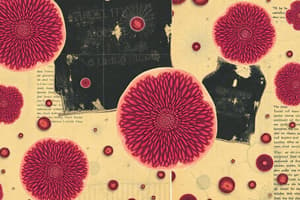Podcast
Questions and Answers
What are the primary functions of exocrine glands?
What are the primary functions of exocrine glands?
Exocrine glands primarily function in lubrication, digestion, protection, and regulation of various bodily processes.
Identify and describe the three types of exocrine glands based on their secretion methods.
Identify and describe the three types of exocrine glands based on their secretion methods.
The three types are merocrine (exocytosis), apocrine (part of the cell secreted), and holocrine (entire cell ruptures).
What distinguishes merocrine glands from holocrine glands?
What distinguishes merocrine glands from holocrine glands?
Merocrine glands secrete via exocytosis without losing cell integrity, while holocrine glands destroy the entire cell during secretion.
Provide an example of an apocrine gland and explain its role.
Provide an example of an apocrine gland and explain its role.
How do pancreatic glands contribute to the digestive process?
How do pancreatic glands contribute to the digestive process?
What role do sebaceous glands play in skin health?
What role do sebaceous glands play in skin health?
What is the significance of exocrine glands in temperature regulation?
What is the significance of exocrine glands in temperature regulation?
Discuss a potential consequence of dysfunction in exocrine glands.
Discuss a potential consequence of dysfunction in exocrine glands.
Flashcards
What are exocrine glands?
What are exocrine glands?
Glands that release substances into a duct, which carries these secretions to the surface of the body or a body cavity.
How do merocrine glands secrete?
How do merocrine glands secrete?
Exocytosis is the process, ensuring the cell's integrity.
How do apocrine glands secrete?
How do apocrine glands secrete?
They release their products through a process involving fragments of the cell, often along with its contents.
How do holocrine glands secrete?
How do holocrine glands secrete?
Signup and view all the flashcards
What is the function of salivary glands?
What is the function of salivary glands?
Signup and view all the flashcards
What is the function of sweat glands?
What is the function of sweat glands?
Signup and view all the flashcards
What do sebaceous glands secrete and what is its purpose?
What do sebaceous glands secrete and what is its purpose?
Signup and view all the flashcards
What is the function of pancreatic glands?
What is the function of pancreatic glands?
Signup and view all the flashcards
Study Notes
Definition and Function
- Exocrine glands secrete substances into a duct system.
- Ducts carry these secretions to the body surface or body cavities.
- Examples vary widely in structure and function.
- Secretions include proteins, enzymes, mucus, sweat, and oils.
- Functions include lubrication, digestion, protection, and bodily process regulation.
Types of Exocrine Glands
- Classified by secretion method and structure:
- Merocrine (eccrine) glands: Secrete via exocytosis; most common type. Examples include sweat and salivary glands.
- Apocrine glands: Release products containing parts of the cell. Examples include some sweat glands (armpits, genitals).
- Holocrine glands: Destroy the cell to release the product, example: sebaceous glands.
Structure of Exocrine Glands
- Structures vary based on their function.
- Most have a duct system, varying in complexity.
- Gland cells can be arranged simply or in branched patterns.
- Secretions are tailored to the gland's role.
Examples of Exocrine Glands and their Functions
- Salivary glands: Produce saliva with digestive enzymes for lubrication.
- Sweat glands: Release sweat for temperature control and waste removal.
- Sebaceous glands: Secrete sebum for skin lubrication and waterproofing.
- Pancreatic glands: Release digestive enzymes into the small intestine.
- Mammary glands: Produce milk for infant nourishment.
- Tear glands: Create tears to lubricate the eyes and contain lysozyme (antibacterial).
- Many other specialized exocrine glands exist throughout the body.
Mechanisms of Secretion
- Exocrine glands utilize diverse secretion mechanisms.
- Merocrine secretion: Vesicles release contents (exocytosis), no cellular damage.
- Apocrine secretion: Portions of the cell (fragments) are released with the secretion.
- Holocrine secretion: Entire cell disintegrates during secretion.
Diseases Affecting Exocrine Glands
- Dysfunction disrupts secretions leading to various issues.
- Cystic fibrosis: Affects mucus secretion in the lungs and digestive system.
- Some cancers (adenocarcinomas) can originate in exocrine glands.
- Other pathologies may result from gland dysfunction.
Studying That Suits You
Use AI to generate personalized quizzes and flashcards to suit your learning preferences.



